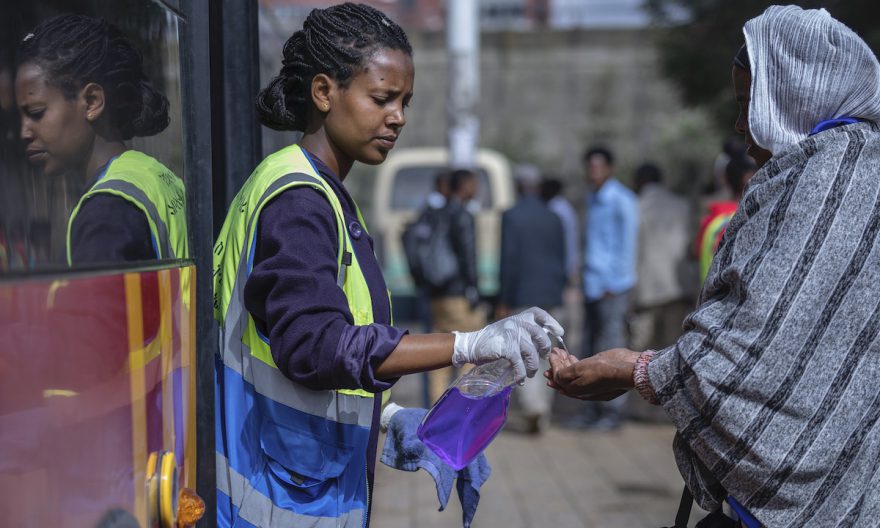
According to World Bank, Ethiopia’s economy experienced strong, broad-based growth averaging 9.4 percent a year from 2010/11 to 2019/20. However, its real Gross Domestic Product (GDP) growth slowed down to 6.1 percent in 2019/20 due to the outbreak of COVID-19(corona virus) pandemic. Industry, mainly construction, and services accounted for most of the growth. Agriculture was not affected by the COVID-19 pandemic and its contribution to growth slightly improved in 2019/20 compared to the previous year. Private consumption and public investment explain demand-side growth, the latter assuming an increasingly important role.
Like the rest of the world, Ethiopia has been experiencing the unprecedented social and economic impact of the COVID-19 pandemic. The COVID-19 shock is expected to be transitory with potential recovery possible in 2021, but the overall adverse economic impact on Ethiopia will be substantial. The economic impact of COVID-19 includes the increased price of basic food items, rising unemployment, slowdown in growth, and increase in poverty.
While external demand remains weak a year into the COVID-19 pandemic, Ethiopia seems to have been spared from the worst outcomes and is showing some signs of recovery, according to the latest World Bank economic analysis for the country.
The eighth Ethiopia Economic Update, Ensuring Resilient Recovery from COVID-19, finds that despite the 4.1 percent decline in merchandise exports, excluding gold, during the first half of the current fiscal year, most items (except garments) started to recover during October-December, 2020. Services and exports started to recover as well and remittances rebounded strongly during the first half of the fiscal year, the report says, while foreign direct investment inflows continue to decelerate due to uncertainty.
“These early signs are a good indication that the Ethiopian economy is starting to recover from the COVID-19 crisis,” said Miguel Eduardo Sánchez Martín, World Bank Senior Country Economist and lead author of the report. “However, as shown by the experience of other countries, there is little room for complacency, as infections have surged in February and March and reported daily cases are surpassing the levels observed at their highest in August last year. In addition, recovery may be uneven, and there are likely to be some lasting impacts on households and individuals,” he added.
High-frequency phone surveys conducted by the World Bank in collaboration with the Jobs Creation Commission (JCC) and the Central Statistical Agency (CSA) find that most companies that had to temporarily close their business at the onset of the pandemic have reopened. However, median monthly sales revenue in October remained at just a third of the pre-COVID-19 level, the report notes.
Employment rates rebounded in the second half of 2020, reaching pre-COVID-19 levels in rural areas, but remaining slightly lower than before the pandemic in urban areas. The share of households facing reductions in their income have been reduced from more than half at the onset of the pandemic, to about a quarter by October 2020. While surveys suggest the food security situation is not significantly worse than prior to the pandemic, at least in terms of food availability, the report notes that depressed incomes due to the crisis and rising inflation are likely to make it difficult for some households to be able to afford food.
The policy response to ensure Ethiopia’s resilient recovery from COVID-19
Response measures introduced by the government, including tax deferrals and waivers, liquidity provision to commercial banks, measures to ease access to credit and loan refinancing, logistics facilitation and food distribution measures have contributed to cushioning some of the impacts from the crisis. However, the report notes that a 5 percent decrease in payment collection by commercial banks during the first half of the fiscal year suggests some firms and households continue to struggle to repay their loans and more needs to be done, including:
- Containment. To minimize human and economic damage and flatten the current second wave of infections, it will be a key to remain vigilant, observing containment and surveillance measures. The report warns that it will also be crucial to ensure a swift deployment of the vaccine by addressing any gaps identified in the readiness assessment.
- Mitigation. There is a need to continue updating the safety net benefits to address the loss in purchasing power caused by inflation and to expand coverage and facilitate registration for new beneficiaries. Safety nets are a lifeline against current and future shocks. It will also be important to continue strengthening the successful measures adopted so far to prevent food supply disruptions.
- Firm support. Going forward, there should be more focus on the provision of credit to small and medium enterprises and the self-employed, much of whom are women, who are bearing the brunt of the pandemic.
- Adapting to the new normal and building back better. In a world in which virtual interaction is increasingly a need, it will be important to implement the new Proclamation on e-Transactions and to strengthen the regulatory framework to facilitate digital financial services. Second, to make the most of the reconfiguration of global value chains, the report recommends authorities revisit existing investment incentives, while preparing as
- well towards World Trade Organization accession.
BY MENGISTEAB TESHOME
The Ethiopian Herald May 14/2021



